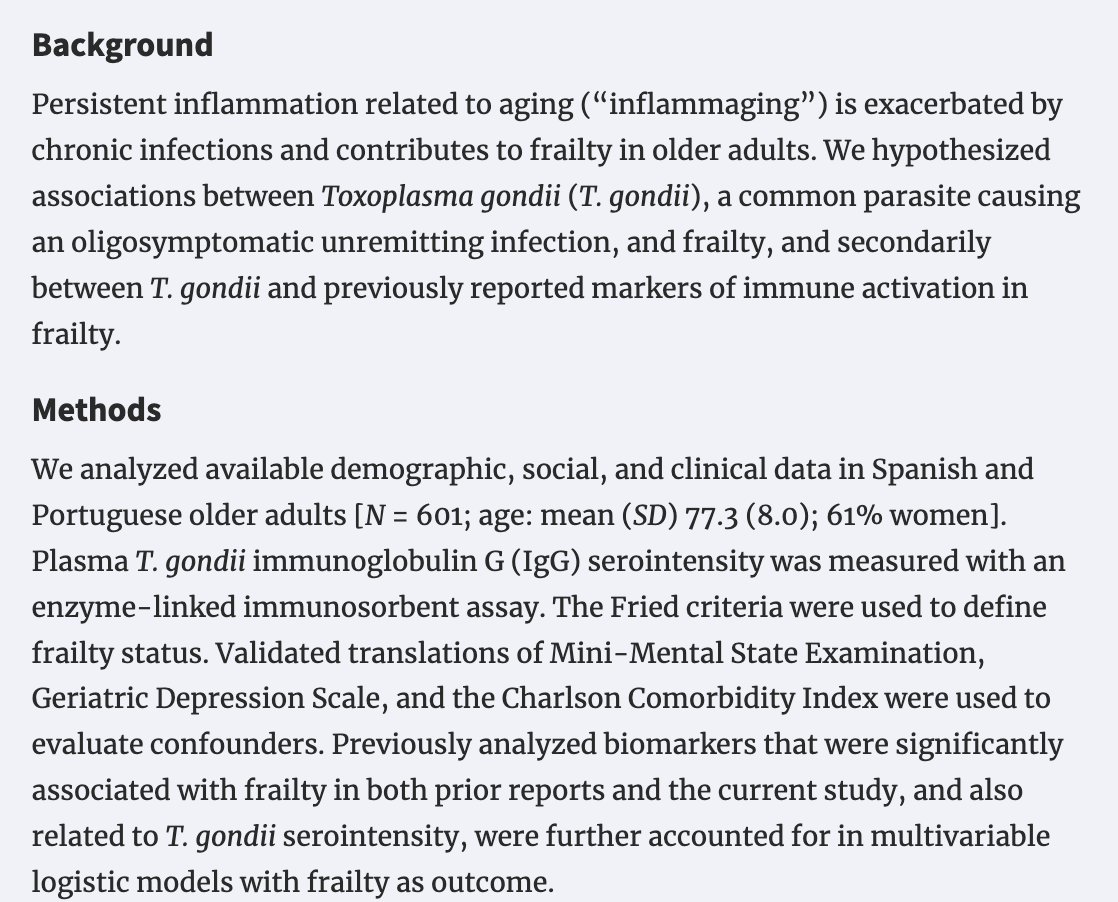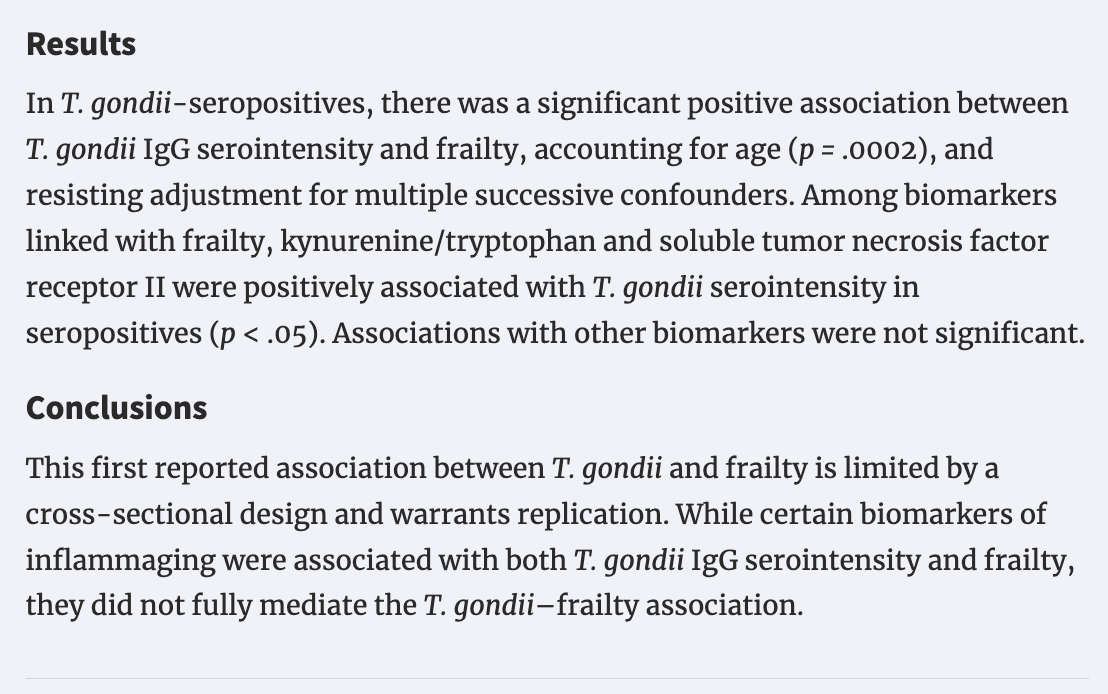Study Correlates "Inflammaging" with Toxo Seropositivity
Some of the methodology is flawed I believe but lots to unpack
A dear friend sent me a study that kind of works toward my grand theory that I have been talking about. On a quick look, it’s a boring study, unless you know what to look for.
The study looked at 601 elders and found a correlation between the biomarkers for “frailty” and antibodies against Toxoplasma gondii, a small intercellular parasite that is related to the bug that causes malaria, very prevalent in the west, and at the moment rather under-appreciated by the learned men. (It is under-appreciated because there is no vaccine to sell yet. They’ll tell us as soon as they come up with a $hitty vaccine to sell. And it’ll be extremely tragic as the “toxo epidemic” is real in my opinion (along with an epidemic of other non-viral under-the-radar bugs like molds, other fungi, etc.) but, as it goes, their new vaccine will only maim. And, God, I looked at some of the toxo vaccines they are working on, a conversation for another day but it made my hair stand up.)
Toxo primer
Before we talk about the study, I want to point out a few things that are easy to miss unless you’ve dug deep into this particular bug. I am also including a PDF of the article I wrote about it last year. The things I am saying below are based on a lot of reading and thinking, my Dr. Mercola article (PDF) has the references, here I am just going to convey the gist.
So in humans, this bug is known to exist in two forms. One is the “active” form in which it multiplies quickly, busts cells, occupies new sells, multiplies quickly, busts cells, etc. That form is called “tachyzoites.” The other form is a tissue cyst, there can be hundreds little monsters sitting inside a cyst. The building material that the parasite uses for the cyst is in part “borrowed” from the cell membrane, and so it hides from the immune system well. That form is called “bradyzoites.”
In the bradyzoite form, it almost completely changes its cell surface structure comparing to the tachyzoite form, and so to the host, it’s a new animal of sorts. For that reason, once the parasite converts to tissue cysts, the tachyzoite-specific antibodies start waning, they keep waning and waning, and at some point they wane to almost nil. That is true for both IgG and IgM antibodies that they usually check for when they do blood tests. (The outdated classic view is that the IgG antibodies stay forever but, based on more in-depth literature, it is not the case.) Bradyzoite-specific antibodies may very well be present and detectable all the way through but the typical blood tests don’t check for them.
At med schools, the future doctors are taught that toxo tissue cysts are no big deal. Sure, one third of the population lives with them (that’s the official number, and some countries like Germany and France have much higher numbers, like 50%+). But, they say, as long as you don’t have AIDS or something, it’s no big deal. (As far as the fact that a lot of elders develop dementia and go senile, it is unrelated, a mystery, something to do with aging-related spontaneous biochemical processes or mysterious chronic inflammation, for which we have drugs to sell. No guarantee but there are drugs to sell.)
I am a curious person, and I looked into the more advanced / recent research. The more advanced research finds that tissue cysts are not that harmless and can cause detrimental inflammation without the conversion to the “active” form of the parasite--and no, one doesn’t have to have AIDS for that to occur. (What’s AIDS? A medical label, a whole other conversation, I beg you to not get distracted with this side note about AIDS, the actual topic of the story is important on its own. If you want to talk about AIDS, I’ll have to page Celia for that :)
So toxo. The bug can jump from the tissue cyst form to the active form at any time—and guess what happens then? If it does so after a decade or two or three—during which the old tachyzoite-specific antibodies may eventually become undetectable—the tachyzoite-specific antibodies become recognizable by your typical tests again! That is how I see it, and verifying require broad use of bradyzoite-specific serology tests and a broad study of a lot of people over decades. Oh and in the pharmaceutical medicine, they don’t know how to get rid of bradyzoites anyway.
Here is the article I wrote about toxo for Dr. Mercola last fall, and I have found more interesting things since.
Also a few philosophical comments the recent toxo study. One, they are saying that the bug exacerbates the mysterious age-related inflammation. And I am all for checking things thoroughly and honestly and figuring out causation precisely but hey, why state it as a fact that it exacerbates inflammation as opposed to causes it? Could it be that the inflammation is not “age-related” but infection-related (doh), and there could even be more than one bug? And could it be that the mainstream needs to rethink the entire thing, and … God, never mind, here comes the vaccine. (When the foundation is rotten, the solutions are f**ked.)
The recent study
[oligosymptomatic = small or insignificant symptoms; unremitting infection = persistent infection that doesn’t go away; in other words, that particular segment of the study cites the outdated classic view that this bug stays with you forever but it’s no big deal.]
(SOURCE)
Here is what Live Science says:
Infection with T. gondii triggers the immune system to produce antibodies to fight off the infection, called toxoplasmosis. Most people, except those who have weakened immune systems or are pregnant, can easily control toxoplasmosis and subsequently don't develop any symptoms. In fact, more than 40 million adults in the U.S. are estimated to be infected with T. gondii, though the vast majority don't know it. However, the parasite often remains in the body — for example, as slow-growing cysts in muscle and brain tissues that trigger low levels of chronic immune activation and the upregulation of pro-inflammatory molecules called cytokines.
With this in mind, the study authors hypothesized that chronic T. gondii infection may be associated with inflammaging and frailty in older adults. They took blood samples from 601 people in Spain and Portugal, 403 of whom had T. gondii antibodies, meaning they'd previously been infected with the parasite. They also measured the people's frailty using a five-point scale and considered other potential influential factors, such as having depression or being cognitively impaired.
Even after considering these possible confounders, the authors found that people who had a stronger antibody response to previous T. gondii infection were more likely to be frail. Two types of immune-mediated biomarkers that had previously been linked to frailty — kynurenine/tryptophan and soluble tumor necrosis factor receptor II — were also more common in their blood.
“As we age, our bodies are exposed to persistent, low levels of inflammation in the absence of infection, known as "inflammaging," which can contribute to frailty in later life and be exacerbated by chronic infections.”
Inflammaging (another fancy word meaning “we have no idea but we have a word”)
Wiki:
Inflammaging (also known as inflamm-aging or inflamm-ageing) is a chronic, sterile, low-grade inflammation that develops with advanced age, in the absence of overt infection [translation: an infection that the doctors don’t know how to diagnose or didn’t bother to check], and may contribute to clinical manifestations of other age-related pathologies. Inflammaging is thought to be caused by a loss of control over systemic inflammation resulting in chronic overstimulation of the innate immune system. Inflammaging is a significant risk factor in mortality and morbidity in aged individuals.
First off, let me please express my extremely opinionated opinion on “inflammaging.” Here is my opinion: I think it’s a bunch of crock. Old people are not supposed to be inflamed just because they are old. This term just normalizes what happens to people when we live in a poisoned world and lack a culture of regularly ridding our bodies of hostile bugs with various spices and herbs.
Learned men with titles just love coming up with fancy words for the things that they don’t understand—but still want to look smart talking about!
Inflammaging. God. This calls for a philosophical interlude with a practical ring to it.
The biological side of things
In the West, we believe we are clean, and we don’t have a culture of periodic (healthy) cleansing ourselves from pathogenic bugs.
Westerners are infested with God knows what. Westerners are also busy, distracted, and used to suppressing what their bodies actually feel. We are used to focusing on our professional lives and being a little sick in mysterious ways here and there while young, and then decomposing when old. Well, no one thinks they are going to personally decompose but when older people get high blood pressure, heart problems, cancer, dementia, and all those things, we think—of course they do. They are old!
Some of the infestation comes through “regular” ways (food, water, contact, etc.), and some (not an insignificant part, alas) comes through contaminated vaccines.
Westerners often get infested with God knows what at a younger age. But while the bodies are strong, people can still function, and the doctors are oblivious of those things, so it flies under the radar.
However, as people age, the bugs raise their heads and start wreaking havoc. But our medical system is not designed to catch it well, and so people get diagnosed with various mostly fictitious—or at least arbitrary—syndromes, get prescribed “bandaid” drugs, and so it goes. “What do you want? He or she is old!”
The industry side of things
Our medical system is run by a mob
Sure, there is an abundance of honest, well-intended professionals—but many of them are tragically caught in the mentality and procedures put forth by the mob. Med school curricula and textbooks are designed by the mob. Conferences and publications of note are financed by the mob. Medical research is controlled by the mob. State regulators are friends with the mob, etc.
Usually, the trends, concepts and methods go mainstream do so because they become profitable to the mob
Various idealistic geniuses coming up with cheap cures that don’t meet the mob’s financial requirements—as well as the whole class of “sore thumb” herbalists, alternative practitioners etc. are demonized and attacked by the mob
I guarantee that the moment the commercial “vision” and strategy of how to sell vaccines against fungi and parasites on a massive scale is ready to go, that will be the direction of the mainstream
Please mark my word that this is what’s coming, and that they are only going to try and bury the fact that at least in part, that epidemic was caused my traditional and COVID vaccines (and of course the general poisoning and weakening of our bodies was a part of the business model at large” and a contributor to the wobbly state of “public health.”)
About that contagion thing
I am super benevolent toward any sincere person with any beliefs, that’s first and foremost. But I want to make a note of this.
My question to the good people who insist that contagion does not exist in nature, would you personally get intimate with a person diagnosed with an STD? Would you kiss a person with a decomposing limb? If you would, please share what kind of supplements you are on. :)
On my end, I think that the argument against contagion is a logical fallacy. Obviously, every situation is different—and depending on each person’s strength at a given time, an exposure to the same potentially nasty bug may or may not result in picking it up. Also obviously, the existence of living beings—including microbial—whose “agenda” is not so great for us is not a call for living in fear.
I am not into fear. I am specifically opposed to fear. There is plenty of fear mongering going around, I have even been trying to “inject” (haha) some perspective and strength into how the current totalitarian creep is talked about. Realism is good, fear is bad.
Being fearless goes hand in hand with being realistic, so I am going to continue talking about the things that I think are making a great impact on our lives.
Conclusion
As a layman who is definitely not dispensing medical advice at any point, I would like to say: it is very interesting that so many antifungal and antiparasitic medicines and herbs are also reported (via first-person stories) to be helpful against both “COVID” and the adverse effects of the COVID (and sometimes other) vaccines.
A note to readers: If you are in the position to do so, I very much encourage you to become a paid subscriber or donate. I love you in any case, but it helps A LOT, and I am in a dire need to get more donations and paid subscribers while keeping my posts free. Thank you from my heart for your support!








Upon re-reading the analysis in Live Science, I would like to point out another easy-to-miss (and in my opinion tragically incorrect) assumption since that assumption contradicts logic, yet it conforms to the "classic" view (i.e. the tissue cyst is "harmless").
Live Science:
"Infection with T. gondii triggers the immune system to produce antibodies to fight off the infection, called toxoplasmosis. Most people, except those who have weakened immune systems or are pregnant, can easily control toxoplasmosis and subsequently don't develop any symptoms.[<— okay so no symptoms, right?] In fact, more than 40 million adults in the U.S. are estimated to be infected with T. gondii, though the vast majority don't know it. However, the parasite often remains in the body — for example, as slow-growing cysts in muscle and brain tissues that trigger low levels of chronic immune activation and the upregulation of pro-inflammatory molecules called cytokines."
[<— so, according to this, it is the immune system causing the problem because it is for some reason is reacting to those totally harmless tissue cysts, silly immune system, doesn't know it's harmless. Never mind the fact that there is a protozoan parasite hanging out there and multiplying, stealing nutrients, etc. As if our bodies ever do anything for no reason!!! On the practical side, I bet that the moment the industry makes something to sell against bradyzoite form of toxo, they will say (accurately, in my opinion) that they are not harmless.. But they will not say it until they sort out the sales part!]
is this why anti-parasitics like ivermectin may treat cancer?
https://eccentrik.substack.com/p/horse-paste-a-major-cancer-killer